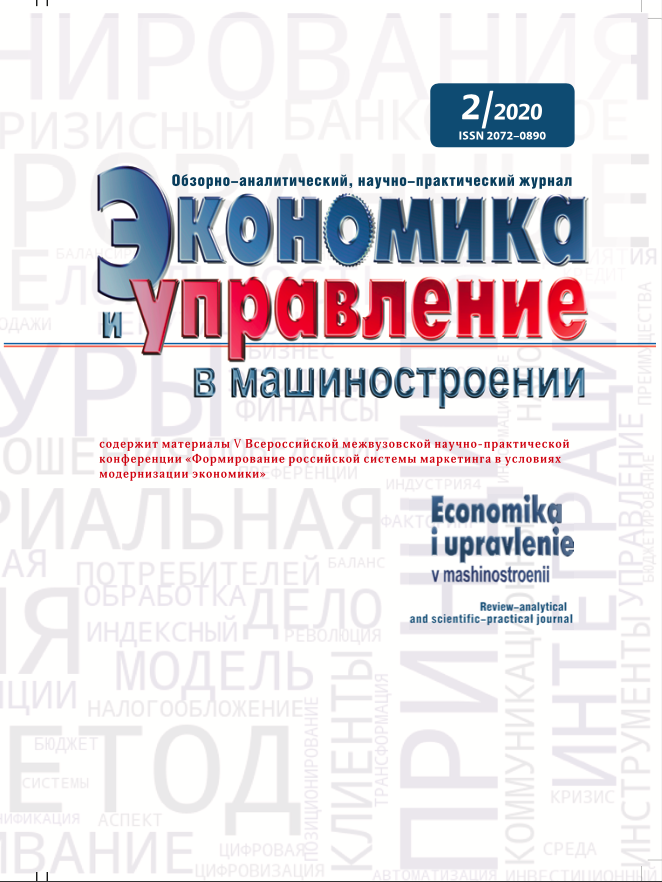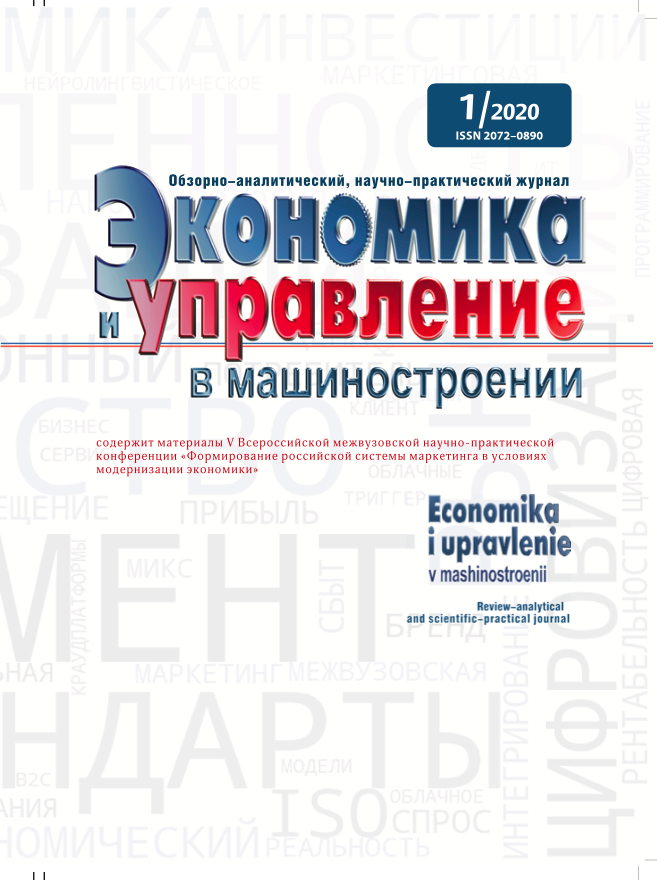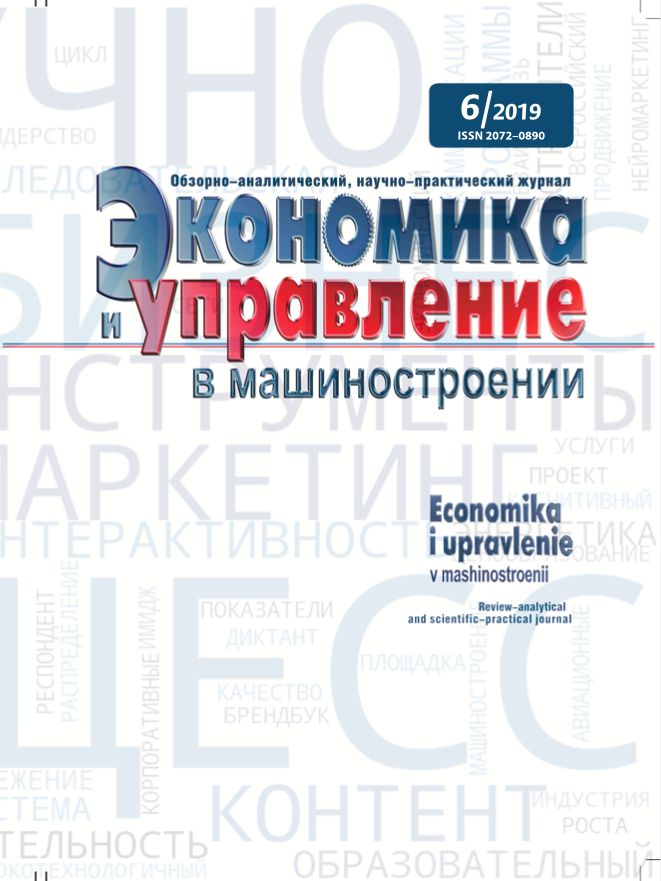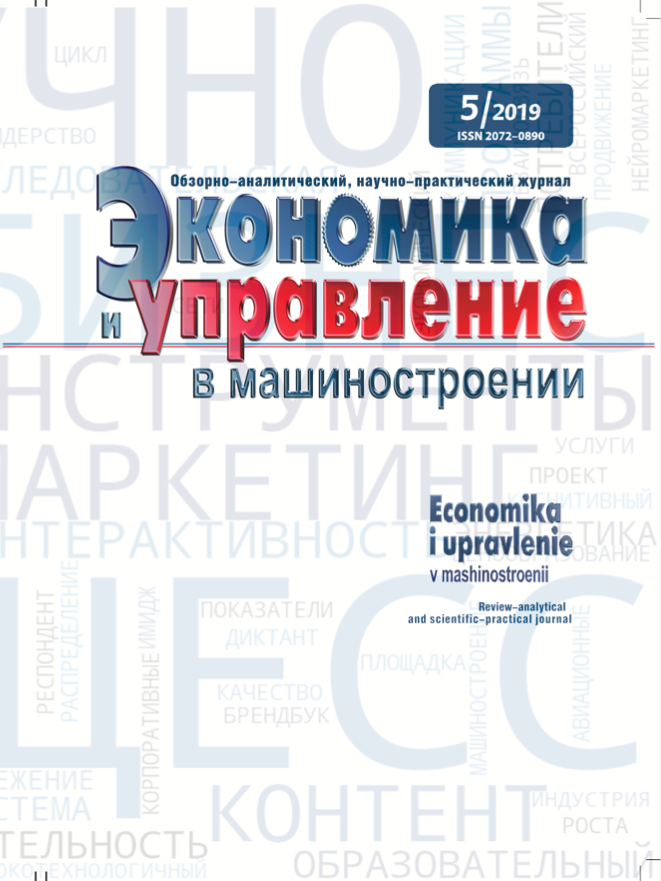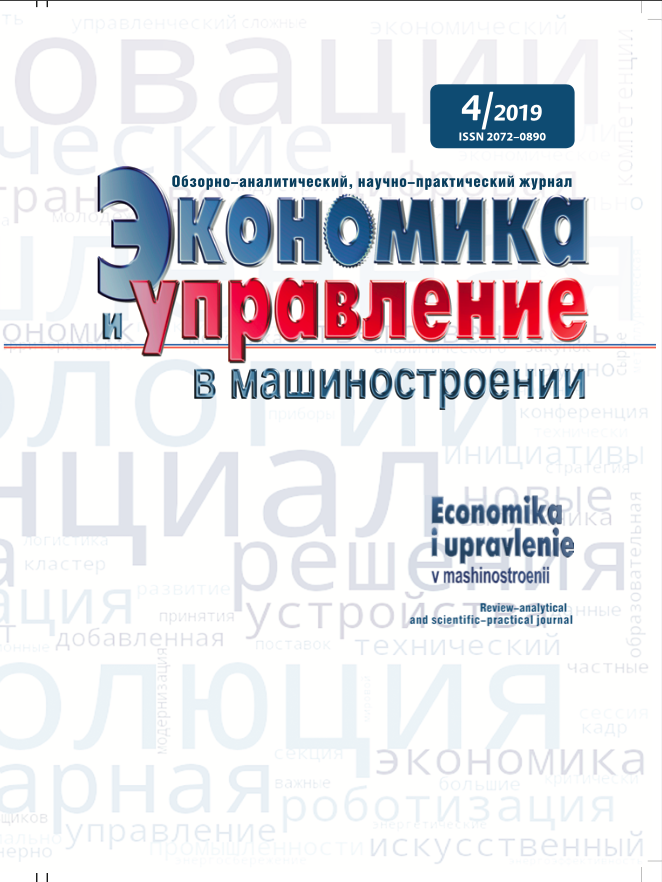OPERATION OF BUSINESS, INDUSTRIAL ENGINEERING
Budgeting system as a form of production and economic processes integration
Starikova E. A., postgraduate at the Economics and Management Department
Academy of Labour and Social Relations, Moscow
Psareva N. Yu., doctor of Economic sciences, professor at the Management Department
Financial University under the Government of the Russian Federation, Moscow
Abstract: Managing the activities of subsidiaries that are part of integrated structures is related to the need to coordinate production and financial plans, which allows achieving strategic goals. Each of the subsidiaries has its own production programs, the balancing of which ensures the synergy of their joint activities and the fulfillment of their tasks. The article discusses the possibilities of using the budgeting system for integrating production and financial planning processes. The advantages of integrating the production and financial planning processes by allocating a separate procedure for balancing the production program within the budgeting system are shown.
Keywords: production planning, budgeting system, balancing
Application of multicriteria evaluation method at machine-building enterprises
Vishnevskiy M. S., postgraduate at the Economics and Management Department
Academy of Labour and Social Relations, Moscow
Lulya V. V., postgraduate at the Economics and Management Department
Academy of Labour and Social Relations, Moscow
Abstract: In modern conditions, machine-building corporations should quickly switch to the new production, and it is necessary to ensure products high quality and minimum production cost. In this context, the counterparties relations system improvement related to the production and marketing of products is of great importance. The integrated structures development makes it possible to respond more flexibly to possible changes in demand indicators, as well as to make optimal use of available material, labour and financial resources. The research examines the basic principles of multicriteria method evaluation of integrated structures’ enterprises in mechanical engineering, based on the theory of fuzzy sets and the hierarchy analysis method.
Keywords: integrated structures, functioning principles, hierarchy analysis method, multicriteria assessment method, integration, expert assessments
Optimization of the supply chain as a way to improve transport logistics management efficiency at the enterprise
Dubanevich L. E., candidate of Economic sciences, associate professor at the Economics Department
Moscow Economic Institute, Moscow
Ilchenko S. V., candidate of Pedagogic sciences, associate professor at the Housing and personnel management Department
Moscow Economic Institute, Moscow
Abstract: The most important measure to increase the trade enterprise profit level is to optimize the logistics chain, which helps to increase the profit level, increases the prestige of the enterprise as a whole. The article considers optimization of the logistics chain on the example of a commercial enterprise. Optimization of the logistics chain is presented as a necessary way to improve the transport logistics management efficiency. The article provides a comparative analysis of cargo transportation methods. The ways to save costs for transport logistics are also presented: savings due to the scale of cargo transportation and savings due to the route distance.
Keywords: logistics, logistics chain, transport logistics, cargo movement, transport services logistics, logistics chain, transport logistics, cargo movement, transport services
Development of planning tools in industrial holdings
Kalyakin O. A., postgraduate at the Economics and Management Department
Academy of Labour and Social Relations, Moscow
Psareva N. Yu., doctor of Economic sciences, professor at the Management Department
Financial University under the Government of the Russian Federation, Moscow
Abstract: Coordination of holding participants’ interests through planning system restructuring is a necessary and mandatory step to achieve the unity of interests of all holding participants. Creating a balanced system of production programs for all business units of the holding will ensure the unity of all participants in achieving the objectives and reduce the risks of their failure. The article considers the problems of planning tools developing in industrial holdings aimed at balancing production both within each business unit and the holding as a whole. The author reveals the connection between the production planning tools development and enterprise economic management.
Keywords: production planning, holding, production balance
Automated control systems applicated at the industrial enterprises
Trifonov P. V., candidate of Economic sciences, associate professor at the Management Department, Head of Master programme «Operational Management»
Financial University under the Government of the Russian Federation, Moscow
Makevnina A. Yu., master student
Financial University under the Government of the Russian Federation, Moscow
Abstract: The main features and stages of the digital economy developing are described in the article. The purpose of the research was to consider the main automated systems which are integrated at the industrial enterprises in order to keep or improve current market positions. Relevance of the article is determined by the fast development of new technologies which created new reality where modern companies have to survive. Huge step forward recently made by the east companies has intensified the competition on the world market of goods and services.
Keywords: digital economy, automatization, information technology, Industry 4.0
INNOVATIVE INVESTMENT ACTIVITY
Impact of the tax system on the enterprise’s innovative development
Levitskaya N. L., candidate of Economic sciences, associate professor at the Economics, production organization and management
Bryansk State Technic University, Bryansk
Levochkina T. A., candidate of Economic sciences, associate professor at the Economics Department
Moscow Economic Institute, Moscow
Abstract: The article discusses the importance of the tax system in the of enterprises’ innovative activities development. State legislative regulation in this area is limited to the regulation of state support for innovation, the main tool of which is the legislation on taxes and fees. Today, the legislation on taxes and fees contains a large number of measures to support the taxpayers’ innovative activity, mainly related to the scientific research and (or) development projects’ implementation. The taken measures made it possible to observe some growth in innovation activity. These indicators show the urgent need to take effective measures to stimulate domestic organizations’ innovation activity, create legal and financial conditions for expanding innovation within the country. But at present, there is no systematic approach to the consistent legal framework formation in the innovation activity field on the state scale. Therefore, the development of the most innovative activity is hindered.
Keywords: taxation, innovation activity, investment tax credit, tax benefits and preferences
MARKETING, SALES APPROACH
Modern marketing technologies forming a client experience
Uzakov B. I., master student
Financial University under the Government of the Russian Federation, Moscow
Nazarov M. T., postgraduate at the Corporate Finance and corporate governance Department
Financial University under the Government of the Russian Federation, Moscow
Abstract: The article reveals the concept and importance of the customer experience formation, the importance of this activity for the organization’s effectiveness, analyzes modern marketing technologies that provide a new vision for the customer experience formation process. The theoretical basis of customer experience formation used in the article is supported by concrete examples from the practice, this activity development potential in the current market conditions is considered. The study allows us to conclude that the latest IT technologies usage in the companies’ marketing activities is of high importance, which allows us to improve the creating customer experience methodology.
Keywords: marketing, customer experience, new marketing technologies, customer loyalty
Transformation of marketing in crisis
Zaharenko I. K., candidate of Economic sciences, associate professor at the Logistics and Marketing Department
Financial University under the Government of the Russian Federation, Moscow
Abstract: The article considers the goals and objectives of anti-crisis marketing in the context of Russian crises history from 1990 to the crisis of 2020. Special attention is paid to marketing technologies used in crisis, such as consumer behavior analysis in crisis, goods and services positioning, purchase decision making models, and marketing budgets formation. The priorities of anti-crisis marketing related to the marketing of innovations are highlighted. The issues of company’s diversification as a strategic advantage in a crisis are considered. The most problematic and promising industries are identified, as well as the marketing technologies’ features of the crisis in 2020.
Keywords: history of Russian economic crises, marketing aspect of crises, marketing transformation, marketing budget, segmentation, positioning, sales management, consumer behavior, competitive advantages, per- sonification, personalization
Factoring as one of the modern effective marketing tools
Dubanevich L. E., candidate of Economic sciences, associate professor at the Economics Department
Moscow Economic Institute, Moscow
Zvezdichev G. Yu., candidate of Economic sciences, associate professor at the Natural- science disciplines Department
associate professor at the Economic Theory Department
Moscow International University, Moscow
Moscow Aviation Institute (National Research University), Moscow
Abstract: The need for factoring arises in connection with the commodity credit provision to an organization. Factoring is associated with the new products’ introduction to the market, the organization’s entry into new niches and markets, competition, increased sales, and profitability. The supplier and the buyer are in a favorable position when entering into a purchase and sale agreement using a factoring scheme: for the seller factoring is a short – term loan received without payment for goods or services by the buyer. The article presents an analysis of the factoring scheme when making a transaction on the example of a commercial organization.
Keywords: factoring, marketing tools, working capital financing, factoring operations, factoring scheme
Anti-crisis marketing of territories: industrial aspect
Zhukova N. A., candidate of Economic sciences, professor of the Economics and Management Department
Academy of Labour and Social Relations, Moscow
Shabalov V. V., postgraduate at the Economics and Management Department Head of Sales Department
Academy of Labour and Social Relations, Moscow
LLC Mitrofanova & Partners, Moscow
Abstract: The article discusses the relevance of applying marketing policy various concepts at the present stage in relation to the industry management at the regional level. The necessity of the expanded usage of the marketing interaction concept for the reputation and image formation of a particular territory, including the characteristics of its industrial potential, is revealed. The composition of the necessary communication tools is determined. The conclusion about the content and consequences of the reputation effect that can be obtained as a result of their application is made.
Keywords: anti-crisis marketing, territorial industrial policy, marketing concepts, information and communication tools, reputation effect
Specifics of digital marketing of high-tech companies in Vietnam
Le Hung Ninh, postgraduate at the Logistics and Marketing Department
Financial University under the Government of the Russian Federation, Moscow
Abstract: The article is devoted to the analysis of factors that affect the digital marketing activity in business in Vietnam. Based on testing of 158 companies in Vietnam, the author identified 8 factors that positively affect the activities of digital marketing companies in Vietnam. From the results of the study, the author provides some management implications to help businesses in Vietnam improve their digital marketing activities.
Keywords: digital marketing, enterprises, organizations, clients, business
Methodical approaches to the conscious buying behavior formation in the digital environment
Rozhkov I. V., candidate of Economic sciences, associate professor at the Logistics and Marketing Department
Financial University under the Government of the Russian Federation, Moscow
Abstract: The article considers the problem of the psychological triggers influence on consumer behavior. The author pays attention to the relevance of this problem in the context of the digital society development. Various types of triggers used in the digital environment and determining consumer behavior are considered. The methodology of the informed consumer behavior process, consisting of seven stages, is presented. The characteristic of consumer actions at each stage of purchasing behavior is given. The conclusion is formulated on the proposed methodology adaptation to various market segments, types of goods and services, specific purchase conditions, and it is also proposed to develop training complexes based on it that would help modern consumers in the digital environment.временным потребителям в цифровой среде.
Keywords: consumer behavior, trigger, information, digital environment, guidelines
Evolution of consumer behavior factors and features of their influence
Zaharenko I. K., candidate of Economic sciences, associate professor at the Logistics and Marketing Department
Financial University under the Government of the Russian Federation, Moscow
Abstract: The article considers consumer behavior factors in order to identify patterns in the making a purchase decision process by consumers. The evolution of consumer behavior factors at different stages of marketing development is considered. Special attention is paid to the integrated marketing approach to the factors’ classification that influence the consumer preferences formation. The consumer behavior features in a crisis are highlighted, and the consumer behavior model based on adaptive decision-making on the basis of consumer’s individual and contextual characteristics is considered. Changes in consumer behavior under the impact of the crisis in 2020 are analyzed.
Keywords: consumer behavior, factors influencing consumer preferences, marketing evolution, consumer behavior in a crisis
Transformation of marketing tools in the digital revolution era
Seryshev R. V., candidate of Economic sciences, associate professor at the Management Department
Financial University under the Government of the Russian Federation, Moscow
Blokhin T. M., chief specialist of the System analysis Departmen
JSC BCS Bank, Moscow
Abstract: The article offers five basic marketing principles during the Fourth industrial revolution and discusses their impact on general marketing: cooperation, mutual discussion, mutual creativity, mutual knowledge, and interconnectedness. The principles can be combined with a marketing mix and create a new platform for implementing marketing functions in the digital ecosystem. They are related to each other and form a holistic concept of creating innovative marketing tools in the digital revolution era. The presented conceptual framework defines the direction of further research in the marketing field in the context of Industry 4.0.кетинга в контексте развития Индустрии 4.0.
Keywords: marketing, digitalization, advertising, Internet, digital revolution
ANALYTICAL RESEARCH
Research of manufacturing industries’ activities
Kamaletdinov A. Sh., candidate of Physico-mathematical sciences, associate professor at the Data Analysis, Decision-making and Financial Technology Department
Financial University under the Government of the Russian Federation, Moscow
Ksenofontov A. A., candidate of Physico-mathematical Sciences, associate professor at the Management Department
Financial University under the Government of the Russian Federation, Moscow
Abstract: The article explores the branches of the economic activity type Manufacturing. The main goal of the article is to explore the efficiency of the Russian regions’ functioning in the manufacturing industry. An index method is used as a private-scientific method of research. As a result of the calculations, the efficiency of all Russian regions’ functioning by economic activity type Manufacturing was evaluated and their rating for 2017 was compiled. The most and least effectively functioning subjects were identified.
Keywords: management, finance, taxes, statistical data processing, index method

